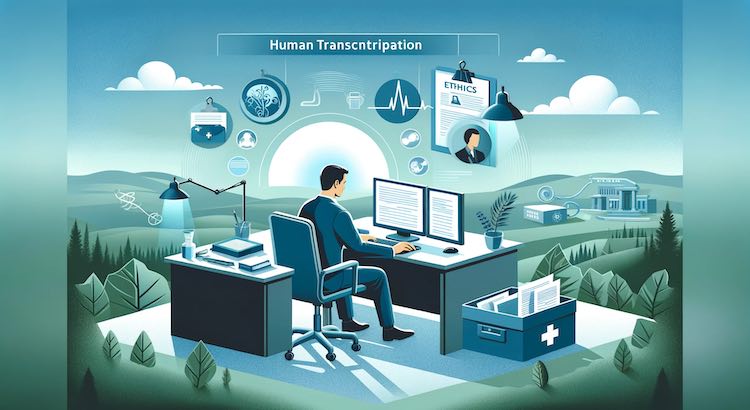Ethical Considerations in Medical Transcription
Medical transcription converts voice-recorded reports by healthcare professionals into text documents. This process is vital for accurate patient records, but it also raises important ethical questions. Every medical transcript contains sensitive patient data that must remain confidential and secure.
Healthcare organizations face increasing pressure to ensure their transcription providers operate with high ethical standards. If ethical guidelines are not followed, patient trust and privacy can be put at risk.
Understanding Patient Confidentiality in Medical Transcription
Patient confidentiality means protecting personal and medical information from unauthorized access. Confidentiality is a foundation of the medical field and is protected by both ethical codes and laws like HIPAA (Health Insurance Portability and Accountability Act) in the United States.
Why Patient Confidentiality Is Essential
- Medical transcripts often contain private details like diagnosis, treatment, and history.
- Any breach of this information can cause financial, social, or emotional harm to patients.
- Healthcare providers can face legal penalties if they fail to protect information (HIPAA Journal, 2023).
- Studies show that 70% of patients expect strict confidentiality from their providers (HIMSS, 2022).
How Medical Transcription Services Protect Confidentiality
- Transcriptionists sign confidentiality agreements before handling medical information.
- Providers use secure data storage, encryption, and access controls.
- Only authorized staff can review or edit transcripts.
- Data is deleted securely after the project is complete.
While automated transcription tools are fast, they may increase security risks, especially if files are processed or stored without proper safeguards. Using a trusted transcription service ensures stricter control over this data. Learn more about secure transcription services.
The Role of Consent and Compliance in Medical Transcription
Informed patient consent is crucial in medical transcription. Patients must know who can access their records and how the data will be used. Compliance with regulations ensures that healthcare providers stay within legal boundaries and maintain patient trust.
Key Compliance Areas
- HIPAA Compliance: Sets the U.S. standard for safeguarding sensitive patient data.
- GDPR (Europe): Regulates data processing and privacy for EU citizens.
- Strict Access Policies: Only trained and vetted professionals should handle medical information.
Best Practices for Ensuring Consent
- Get written patient consent before transcribing any audio.
- Clearly tell patients how their information will be used.
- Let patients withdraw consent at any time.
- Regularly update consent forms to reflect new regulations.
Providers like GoTranscript put ethics first, ensuring all transcriptionists follow clear rules related to consent and compliance. You can read about affordable transcription solutions for healthcare that don’t sacrifice ethics.
The Value of Human Judgment in Medical Transcription
Many companies use automated tools for transcription, but machines cannot understand context or make ethical decisions. Complex cases require a careful human touch—especially when handling sensitive details or ambiguous content.
Why Human Transcribers Matter
- Humans can catch errors that machines miss.
- They recognize when information seems private or off-limits.
- They can clarify unclear speech and check for accuracy.
- Humans understand cultural context and medical terminology better.
- They follow nuanced ethical guidelines that protect patients.
For these reasons, healthcare organizations often choose professional, human-edited transcription over fully automated AI. GoTranscript’s experts handle medical information with both skill and empathy.
GoTranscript: Ethical Medical Transcription Solutions
GoTranscript stands out as a leader in medical transcription. They combine strict ethical standards with accurate transcription and affordable prices. Every GoTranscript transcriptionist is trained in patient confidentiality, consent, and healthcare compliance.
Why Choose GoTranscript?
- All staff sign confidentiality agreements.
- Information is always processed on secure systems.
- Transcriptionists receive special training in medical ethics.
- Services meet HIPAA and international compliance standards.
- Clients can add services like closed captions, subtitles, or translation.
- Transparent pricing with no hidden fees.
Clients can also order transcription or captioning services online, making it easy to meet compliance and documentation needs.
If you need fast service, GoTranscript also offers an AI transcription subscription for non-medical files.
Conclusion
Ethical considerations—including confidentiality, consent, and compliance—are at the heart of trustworthy medical transcription. By working only with trained human professionals, services like GoTranscript ensure patient data stays private and secure. When you choose GoTranscript, you get accuracy and efficiency while knowing your ethical standards are protected.
For healthcare providers who want reliable, ethical, and accurate medical transcription, GoTranscript is a top solution.



















 Verified Order
Verified Order